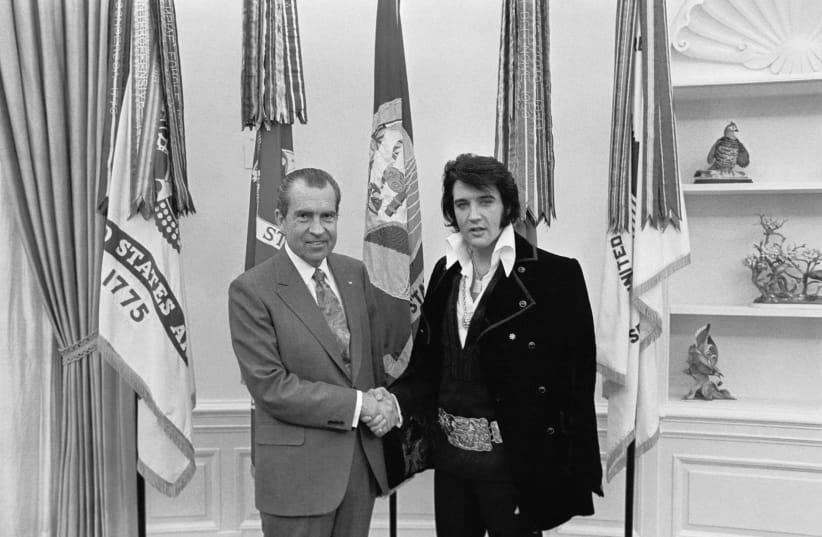The anniversary is marked at the end of Elvis Week, a string of events held at Graceland in memory of Elvis. On Thursday, a candlelight vigil was held at his grave next to his mansion in Memphis, according to WMCTV news. Presley died on August 16, 1977.
For those who have never been to the candlelight vigil from the gates of Graceland to the gravesites, or for those who can’t make it this year you can watch it live. A journey that’s beautiful, touching, emotional and quite surreal.https://t.co/1JAKELh2Xm
— Priscilla Presley (@Cilla_Presley) August 15, 2019
The series, produced by Priscilla Presley and John Eddie, will feature the King as he “trades in his white jumpsuit for a jet pack when he is covertly inducted into a secret government spy program to help battle the dark forces that threaten the country he loves — all while holding down his day job as the King Of Rock And Roll.”
“From the time Elvis was a young boy he always dreamed of being the superhero fighting crime and saving the world!” said Priscilla Presley. “Agent King lets him do just that.”
The planned series does have a precedent in an odd story from Elvis’s actual history when he met president Richard Nixon, according to the Smithsonian magazine.
In December, 1970, the King was traveling with some guns and his collection of police badges when he decided that he really wanted a badge from the federal Bureau of Narcotics and Dangerous Drugs (BNDD).
"The narc badge represented some kind of ultimate power to him," wrote Priscilla Presley in her memoir, Elvis and Me. "With the federal narcotics badge, he [believed he] could legally enter any country both wearing guns and carrying any drugs he wished."
On a red-eye flight to Washington, Elvis wrote a letter to Nixon, saying “Sir, I can and will be of any service that I can to help the country out,” adding that he “would love” to meet the president. “I will be here for as long as it takes to get the credentials of a federal agent.”
After he arrived in the capital, Elvis dropped off the letter at the entrance gate to the White House and met with the deputy director of the BNDD, but did not succeed in obtaining a badge.
In the meantime, Nixon aide Egil “Bud” Krogh, who happened to be an Elvis fan, received the letter by "the King" and persuaded White House chief of staff Bob Haldeman to arrange the meeting. By noon, Elvis arrived at the White House in a purple velvet suit with a gold belt buckle and amber sunglasses. He also brought a Colt .45 pistol mounted in a display case from his Los Angeles mansion as a gift. The Secret Service confiscated the gift.
“When he first walked into the Oval Office, he seemed a little awe-struck,” said Krough, but noted that he quickly acclimated to the situation. Pictures were taken of Elvis and Nixon shaking hands and Elvis showed him his police badges. Nixon’s taping system hadn’t been installed yet, so the meeting wasn’t recorded.
Krough added that Presley indicated that “he thought the Beatles had been a real force for anti-American spirit.”
“The president then indicated that those who use drugs are also those in the vanguard of anti-American protest,” said the White House aide, according to the Smithsonian. “I’m on your side,” said Elvis to Nixon, adding that he’d studied the drug culture and Communist brainwashing. He then asked the president for a badge from the BNDD.
“Can we get him a badge?” asked Nixon. Krough replied that he could and Nixon ordered it to be done.
“In a surprising, spontaneous gesture," Krough wrote, Elvis "put his left arm around the president and hugged him."
Nixon then invited Elvis’s entourage into the Oval Office and gave them White House cuff links. Elvis informed Nixon that “they have wives, too,” so Nixon gave them White House brooches as well.
The meeting was kept secret until columnist Jack Anderson broke the story a year later. After Elvis died and Nixon resigned, the National Archives began selling photos of the meeting. About 8,000 people requested copies, making the photos the most requested pictures in Archives history.
